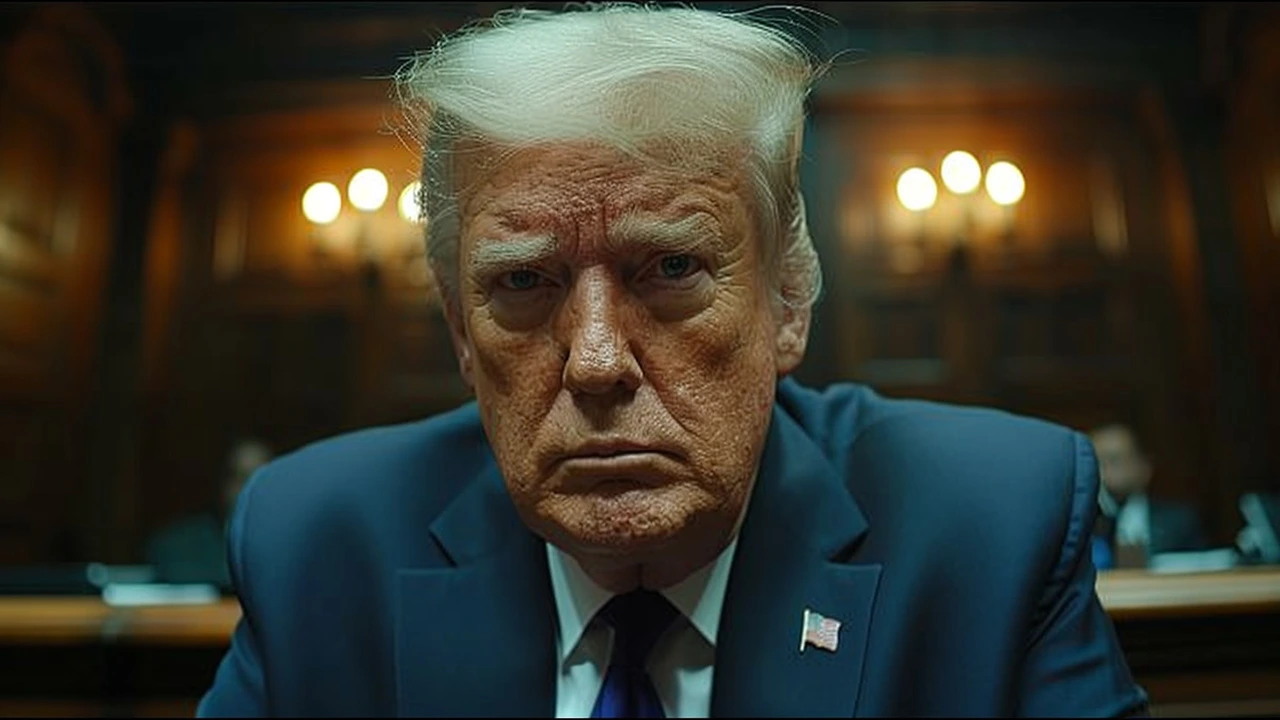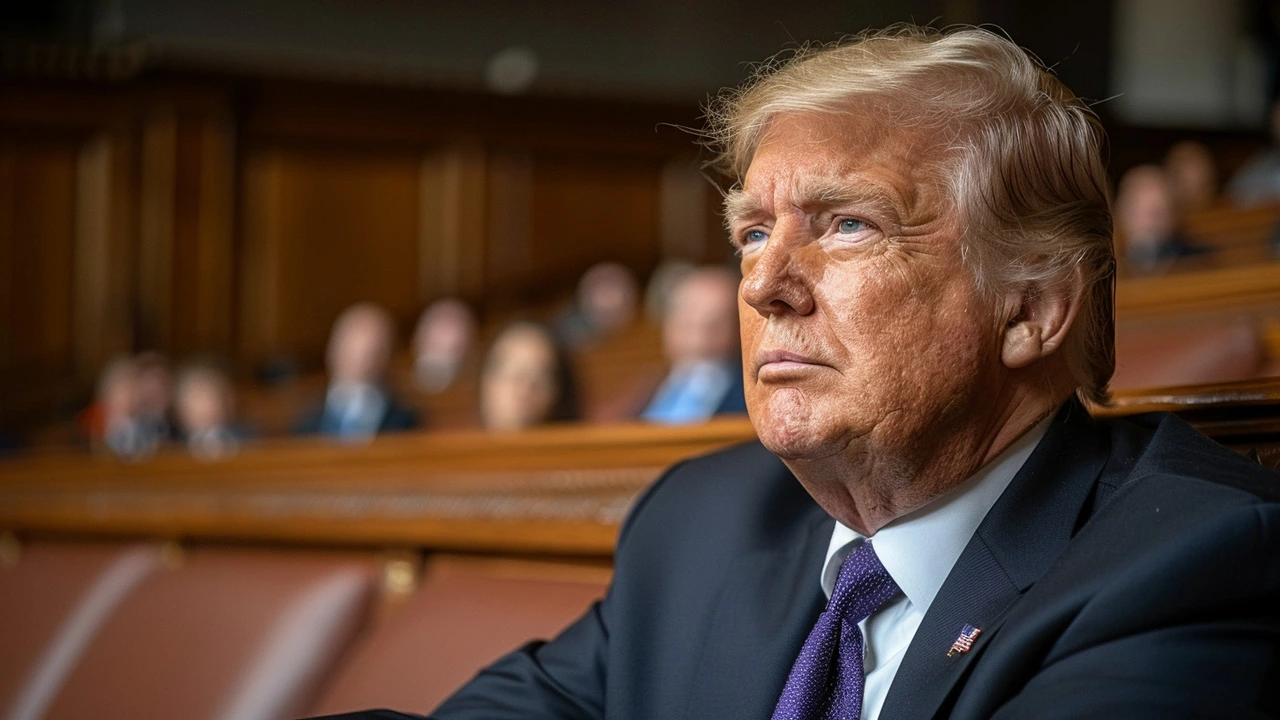Donald Trump Found Guilty on All Counts in Landmark New York Hush-Money Trial

Donald Trump Found Guilty on All Counts in Landmark New York Hush-Money Trial
In an unprecedented turn of events, former U.S. President Donald Trump has been found guilty on all counts in a hush-money trial, marking a historical first. A New York jury concluded that Trump was indeed guilty of all 34 felony charges of falsifying business records in an effort to hide a scandalous payment. The case revolves around a hush-money settlement paid to an adult film star, designed to prevent potentially damaging information from surfacing in public.
The Charges and the Case
The trial delved into accusations that Trump and his associates falsified business records to disguise payments made to prevent the disclosure of an alleged affair with an adult film star. The jury found ample evidence to support the 34 separate felony charges, focusing on how Trump manipulated his business records to cover up these payments. Each count corresponds to distinct entries made in the corporate books, noting the false narrative behind the financial dealings.
A Historic Verdict
The verdict is a landmark decision, marking the first time in U.S. history that a former president has been found guilty of criminal charges. This has sparked intense debate and discussions, with many legal experts and political analysts weighing in on the potential repercussions for Trump's future. Despite numerous legal challenges spanning his career, this ruling stands out as a defining moment, showcasing the far-reaching implications of the former president's actions.
Implications for Trump's Future
The conviction could significantly impact Trump's political career, especially with the upcoming November elections. The guilty verdict raises questions about his candidacy and potential influence within the Republican Party. Skeptics argue that this development could weaken his political base, while supporters contend that it might galvanize his supporters, who view the trial as a politically motivated attack. Only time will tell what this means for Trump's ambitions and his enduring influence on American politics.
The Legal Journey
Trump's legal journey has been lengthy and intricate, with numerous cases and lawsuits marking his term as president and his post-presidential life. This particular trial, however, holds significant weight due to its criminal nature and the high-profile individuals involved. Legal analysts have been closely monitoring the proceedings, noting that the outcome could set crucial precedents for how financial misconduct is addressed at the highest levels of power.

The Public Reaction
The public reaction to the guilty verdict has been polarized. Supporters maintain that Trump has been unfairly targeted, framing the trial as a partisan attack. Conversely, critics argue that justice has finally been served, applauding the judicial system for holding a powerful figure accountable. Across social media and various news outlets, debates rage on, reflecting the deep political divides currently prevalent in the United States.
Looking Ahead
As the dust settles, both Trump and his legal team are expected to appeal the decision. This could extend the legal battles further, potentially involving higher courts and prolonged judicial scrutiny. Politically, Trump is at a crossroads, with the guilty verdict casting a long shadow over his future endeavors. With the nation watching closely, Trump's next moves will be pivotal in shaping not only his legacy but also the broader landscape of American politics.
The Broader Context
Beyond the immediate legal ramifications, this case underscores broader themes about accountability and the rule of law in the American political system. Regardless of one's stance on Trump, this trial and its outcome highlight the importance of transparency and ethical conduct among public officials. It serves as a powerful reminder that no one is above the law, setting a critical precedent for current and future leaders.
Final Thoughts
In conclusion, the conviction of Donald Trump on all counts in the hush-money trial is a significant moment in U.S. legal and political history. It brings forth crucial questions about the ethical responsibilities of leaders and their accountability to the public. As Trump navigates the fallout, the implications of this verdict will ripple through the political landscape, influencing elections, party dynamics, and public opinion for years to come.
Wow, this is the kind of headline that makes you sit up straight and think about the ripple effects. The conviction isn’t just a legal footnote; it’s a seismic shift for anyone who believed power was untouchable. People are already debating how this will reshape the political battlefield, and the energy in those conversations is electrifying. It’s a reminder that accountability can finally break through the noise, and that’s something we can all rally around.
Oh, sure, because we’ve never seen a former president in trouble before – said no one ever. The sarcasm is practically dripping off this whole saga, and the media’s endless replay is almost impressive in its stamina. Still, you gotta admit, watching the legal drama unfold is like binge‑watching a thriller that refuses to end.
The jurisprudential ramifications of this verdict are, without doubt, profound and multifaceted. Firstly, the application of falsifying business records statutes to a former head of state establishes a novel precedent that could recalibrate the boundaries of executive accountability. Moreover, the unanimity of the jury’s decision across thirty‑four distinct counts underscores an evidentiary rigor rarely witnessed in politically charged trials. In addition, this outcome may invoke a reevaluation of the prosecutorial discretion employed in high‑profile cases, prompting scholars to dissect its alignment with the principles of equal justice under law. The decision also reverberates through the realm of campaign finance, as future candidates will undoubtedly scrutinize the legal frameworks governing personal and corporate expenditures. From a constitutional perspective, the case may incite discourse regarding the interplay between the separation of powers and judicial oversight. Practically, the conviction introduces a tangible obstacle to any prospective political aspirations the defendant might entertain, thereby influencing the strategic calculus of the party apparatus. Furthermore, the media narrative, now anchored in a factual conviction rather than speculation, will likely shift from sensationalism to a more measured analysis. It is also essential to acknowledge the potential for appeals, which will test the durability of the trial court’s findings and perhaps refine appellate jurisprudence. Finally, the societal impact cannot be dismissed; citizens are witnessing a rare instance where the rule of law is demonstrably applied to the highest echelons of power, fostering a renewed public confidence in institutional integrity.
Respectfully, this case also offers a lens into how different legal cultures treat political figures. In some jurisdictions, the very act of bringing such charges would be considered a breach of political decorum, yet here we see a steadfast commitment to due process. The assertiveness of the prosecution illustrates that no boundary is sacrosanct when evidence is compelling.
Let’s cut to the chase: the numbers don’t lie, and the record shows a clear pattern of deception. The aggressive approach the defense took inevitably fell apart under the weight of documented entries. Grammar and precision matter in legal filings, and every false line was flagged and dissected. This isn’t about partisan games; it’s about the concrete fact that the business books were altered deliberately. The court’s thorough examination left no room for plausible deniability, and the verdict reflects that meticulous scrutiny. In short, the conviction is a testament to the power of a well‑structured case.
Honestly, this whole thing was bound to happen sooner or later.